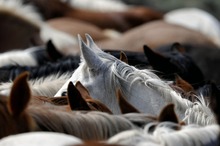As part of the “Horses on the Hill” event, celebrities, local school children, young equestrians and advocates joined Sen. Mary Landrieu, D-La., Rep. Patrick Meehan, R-Pa., and Rep. Jim Moran, D-Va., sponsors of the Safeguard American Food Exports (SAFE) Act (S. 541/H.R. 1094), at the Capitol to urge legislators to permanently protect our nation’s horses from inhumane slaughter.

Urging ban on horse slaughter
This bill would prevent the resumption of horse slaughter operations in the United States, end current export for slaughter abroad, and protect the public from consuming potentially toxic horse meat.
© 201 by Carien Schippers
The event was co-hosted by The Humane Society of the United States, the Animal Welfare Institute (AWI) and the ASPCA (The American Society for the Prevention of Cruelty to Animals).
Participants—including actress Wendie Malick from “Hot in Cleveland” and sports commentator Bonnie-Jill Laflin—met with elected officials to seek their support in passing the SAFE Act. John Boyd, president of the National Black Farmers Association; Stacia Klein Madden, ASPCA Equine Welfare Ambassador and award-winning equestrian and trainer; and representatives from Omega Horse Rescue also participated in the event.
This bill would prevent the resumption of horse slaughter operations in the United States, end the current export of American horses for slaughter abroad, and protect the public from consuming potentially toxic horse meat due to the many undocumented drugs given to horses that can be dangerous to humans if ingested.
The shocking discovery of horse meat in beef products in the European Union underscores the threat to American health, consumer confidence, and the reputation of the entire U.S. meat industry that could result if this practice is brought back to this country.
Sen. Landrieu said: “The practice of horse slaughter for human consumption is revolting to me as a horse owner, but also as a consumer. Horses are not raised for human consumption, and they are frequently treated with drugs and chemicals that are toxic when ingested by humans.
Especially in light of the European horse meat contamination scandals, we must ensure that our food supply at home is not tainted with horse meat, nor should we supply an unsafe food product to foreign industries. I am proud to join my colleagues to introduce the SAFE Act to end the slaughter of one of the world’s most beloved animals and help protect public health.”
Rep. Meehan said: “Horses are not bred for human consumption. Horses are routinely treated with drugs over the course of their lifetimes that are toxic to humans if ingested. At a time when the U.S. Department of Agriculture is threatening to furlough meat inspectors due to budget cuts, American taxpayers should not be subsidizing horse meat inspections for the foreign export market.”
Chris Heyde, deputy director of government and legal affairs for AWI, said: “Those attending this year’s Horses on the Hill event represent the diversity of elected officials, organizations and individuals behind ending slaughter.
"Professional equestrians, horse owners and activists, farmers, horse rescues, and welfare organizations are here to speak out for the tens of thousands of horses that continue to be slaughtered every year while a few in Congress stubbornly oppose a bill that is widely supported in Congress and by the American public. Ending horse slaughter has been one of the most widely supported animal protection issues in decades; it is time to pass the SAFE Act.”
Nancy Perry, senior vice president of ASPCA Government Relations, said: “The overwhelming majority of Americans are intensely opposed to this gruesome practice and contest the use of tax dollars to fund an inherently cruel industry. We stand with a large group of bipartisan leaders on Capitol Hill who have already declared that they will be pressing for accountability and recorded votes on this issue. Now is the time for Congress to permanently ban domestic horse slaughter and the export of our horses to neighboring countries for slaughter.”
Keith Dane, director of Equine Protection for The HSUS, said: “Slaughtering horses for their meat is a cruel, terrifying end for horses and is far from humane. The predatory horse slaughter industry doesn’t ‘euthanize’ old horses, but precisely the opposite: young and healthy horses are purchased at auction, often by people misrepresenting their intentions. We are grateful to Senator Landrieu, Representative Meehan and the other sponsors of the SAFE Act for making it a priority to protect America’s horses and consumers.”
Facts about horse slaughter:
- In November 2011, Congress chose to remove language from an appropriations bill that banned federal inspectors at horse slaughter plants in the United States, opening the door for a return of horse slaughter to American soil, despite broad opposition in this country to the practice.
- Several applications have been filed with the USDA by companies that want to slaughter horses on American soil.
- A January 2012 national poll commissioned by the ASPCA confirms that 80 percent of American voters oppose the slaughter of horses for human consumption.
- Horses are gathered from random sources and there is no system in this country to track medications to ensure their meat is safe for human consumption.
- Horse slaughter is inhumane and the methods used to kill horses rarely result in quick, painless deaths—as horses often endure repeated stuns or blows and sometimes remain conscious during slaughter and dismemberment.
The majority of horses killed for human consumption are young, healthy animals who could go on to lead productive lives with loving owners.
